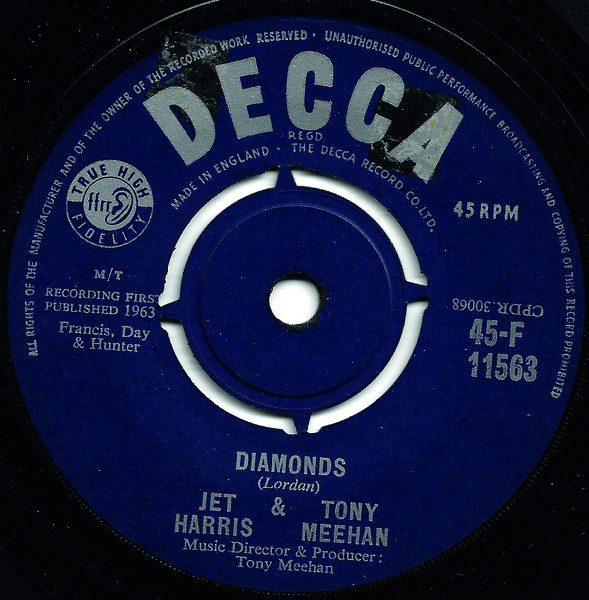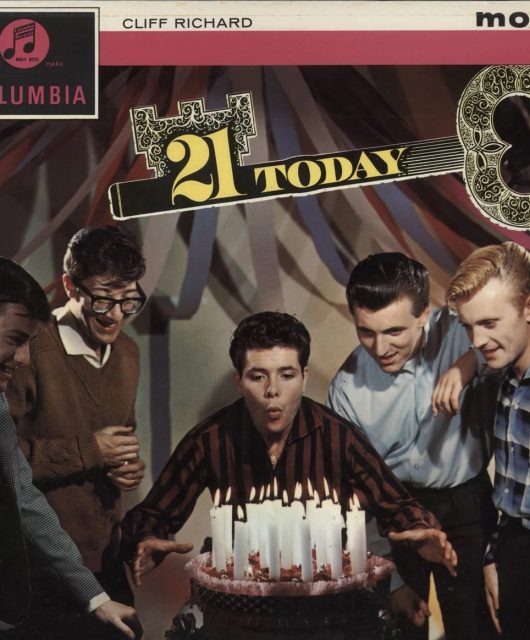Featuring not only two former members of The Shadows but two future Led Zeppelin members, Diamonds gave us one of the greatest instrumental singles of the 1960s
For Jet Harris on 31 January 1963, the taste of victory must have been especially sweet. It had been nine months since he’d split from The Shadows, reportedly due to Bruce Welch’s unhappiness with his drinking, and the bassist had already enjoyed two solo successes – a cover of Bésame Mucho (UK No.22) and his version of the theme from The Man With The Golden Arm (UK No.12).
Diamonds, his third single and first alongside former Shadows buddy Tony Meehan was different, though. Not only was it his first No.1, but it knocked his old band off the top spot after just one week. When you listen to Dance On! alongside Diamonds, it only highlights what Cliff Richard’s former backing band lost when they let Harris (and indeed Meehan) go. Dance On! is a fine, if rather well-behaved record, but it sounds desperately old-fashioned next to Diamonds.
Harris’ moody, Duane Eddy-echoing guitar and that explosion of brass halfway through feel like something ripped from a Sergio Leone Western. If Dance On! was the sound of instrumentals past, Diamonds was its future.
Jet Harris is one of the great nearly-men of rock’n’roll, a titanically talented bassist sadly undone by a crippling addiction to alcohol. Born Terence Harris on 6 July 1939, he acquired his nickname at school due to his prowess as a sprinter.
His interest in music was there from an early age, and he’d even made his own four-string double bass as a teenager (“dreadful to look at, but I developed strong wrists,” he told Vintage Rock ’s Alan Clayson back in 2009).
After quitting his job as a trainee welder, Harris played in a succession of jazz outfits. He then joined The Vipers Skiffle Group, a band that had assembled around London’s 2i’s coffee bar, and which counted Hank Marvin and Meehan among its members.
When the group split, Harris played with the Most Brothers (Blighty’s answer to Phil and Don) before crossing paths once more with Marvin, who, alongside Cliff and guitarist Bruce Welch, had formed a new group, The Drifters. Harris duly joined his former bandmate and suggested Meehan as their drummer.
It was also Harris that dreamed up the name. When American vocal group The Drifters threatened legal action, Harris put forward some new suggestions, including The Zephyrs, The Zodiacs, The Lions and The Tigers. “When I said Shadows,” he recalled, “Hank shouted, ‘That’s it!’”
With The Shadows, Harris and Meehan enjoyed several chart wins including Apache, Kon-Tiki (UK No.1) and FBI (UK No.6). But despite their success, Meehan was itching to branch out and in October ’61, he became a producer at Decca Records, with Harris following him in April 1962. Given their history and the fact that, after leaving The Shadows, Harris signed with Decca, it was inevitable that the two would end up working together once more. Diamonds was the first of three collaborations between the powerhouse rhythm section – and their most successful.
The track was written by Jerry Lordan, who had also penned Apache, The Shadows’ first No.1 without Cliff, and Wonderful Land (their last No.1 before Dance On!). Recorded in November at Decca Studios, Diamonds has a place in history for being the first record that future Led Zeppelin axe hero Jimmy Page played on. Not yet 20, Page was a student at Sutton Art College, but after a gig at London’s Marquee Club, word got out how remarkable this young player was and he’d soon received a request to play for Harris and Meehan.
It’s Harris who handles the electric guitar on Diamonds, using a detuned Fender Jaguar, while Page is on acoustic rhythm. Diamonds is also a landmark 45 in that it features Page’s future bandmate John Paul Jones (then John Baldwin) on bass, marking the first time the two had recorded together. With two former Shadows at one end and two future Led Zeppelin members at the other, Diamonds really was the past and the future of rock’n’roll in one electrifying record.
Diamonds would hold the No.1 for three weeks leading the duo to release two more platters, Scarlett O’Hara (also by Jerry Lordan) which peaked at No.2, and Applejack, a UK No.4.
The duo then parted and, after forming – then swiftly splitting – The Jet Harris Band, and a one-day stint in The Jeff Beck Group (“I went to one rehearsal in a room above a Tottenham Court Road pub,” Jet recalled. “Then we went down to the bar, and that was the end of that”), Harris walked away from showbiz.
In the years after, he worked as a bricklayer, window cleaner and sold cockles, noble professions all – but not what someone as gifted as Jet should have been doing.
After ditching the booze, Harris enjoyed a renaissance in the 80s, reuniting with Meehan to support Cliff at Wembley in 1989, “the highlight of [his] life.”
Meehan left music in the 90s and retrained as a psychologist before his death in 2005, while Harris toured in the 00s in a show titled Me And My Shadows. Sadly, he died in 2011.
Diamonds remains the duo’s crowning achievement, so revered that even their old band eventually took it on. That said, The Shadows’ glossed-up 1983 version doesn’t hold a candle to the original, which still stands as one of the most thrilling instrumentals of all time.






